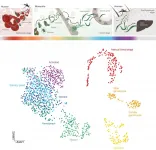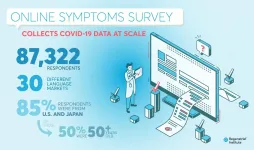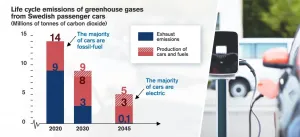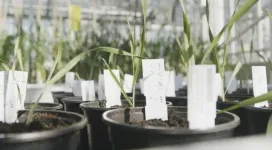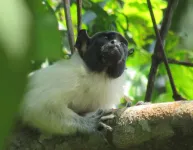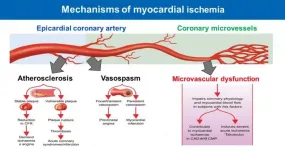(Press-News.org) Researchers have mapped in fine detail the genetic changes malaria parasites go through as they prepare to infect people.
The atlas maps the malaria parasite Plasmodium falciparum in unprecedented cellular detail as it develops inside a mosquito and prepares to infect humans through a bite. This detailed investigation could lead to new ways to block key stages in the parasite's development and prevent transmission through future drugs or vaccines.
Mosquitoes are increasingly resistant to pesticides, and the parasite that causes malaria is also becoming increasingly resistant to antimalarial drugs. This has created an urgent need for new ways to fight malaria, which in 2019 caused an estimated 229 million cases and 409,000 deaths, most of which were young children in sub-Saharan Africa.
To reinvigorate efforts in drug or vaccine discovery, a team from the lab of Professor Jake Baum at Imperial College London and the lab of Dr Mara Lawniczak from the Wellcome Sanger Institute have examined the human malaria parasite Plasmodium falciparum in unprecedented detail. Their results are published today in Nature Communications.
P. falciparum develops in the midgut of a mosquito before travelling to the mosquito's saliva glands, ready to infect a human when the bug bites. During these phases, the parasite goes through many stages important for its development and ability to transmit, including changing into different forms.
The team tracked how these stages were controlled by analysing the activity of genes throughout the process. They isolated the different forms of the parasite and produced 1467 'transcriptomes' - maps of which genes in single cells are turned on or off during the different stages.
When genes are turned on, they instruct the cell to make different proteins and drive developmental changes, such as causing the parasite to exit the midgut and colonise the salivary gland of the mosquito, or to travel through human cells to reach the liver, where the parasite prepares to invade more human cells.
Knowing how these processes work in detail at the cellular level reveals to researchers new targets that could be blocked to stop development, preventing transmission of the parasite.
Dr Eliana Real, from the Department of Life Sciences at Imperial, said: "Being directly based on the human-infective parasite, our new data have clear implications for malaria control, which has an increasing focus on transmission blocking strategies both in terms of drugs that kill the parasite as it moves between stages and protective vaccines. Understanding how parasites behave transcriptionally within the mosquito vector provides a found
dation from which new strategies will surely arise."
As well as surveying the whole transmission cycle of the parasite, the team focused on what is called the sporozoite stage: the form released into the human skin during a mosquito bite. They sorted parasites from within the mosquito during their development, and isolated sporozoites after an infectious bite as they interact with human skin cells. In doing so, they were able to find specific patterns of gene expression that define each of the critical stages in these processes.
Dr Virginia Howick, previously from the Wellcome Sanger Institute and now based at the University of Glasgow, said: "This fine granularity enables us to trace sporozoite developmental processes and to propose new mechanistic targets essential for each step and future vaccine targets for blocking malaria infection."
The team were also able to compare their data with a similar set from the related parasite Plasmodium berghei, a rodent malaria parasite that is often used as a model for studying malaria disease in the lab. This showed which genes are common between species, and which are specific to the human version of the parasite.
Dr Farah Dahalan, from the Department of Life Sciences at Imperial, said: "This level of gene surveillance at the individual parasite level throughout its life cycle will provide an invaluable resource for researchers to discover previously unexplored elements of Plasmodium cell biology, comparative Plasmodium species biology and the development of control methods that target particular pathways or lay the foundations for improving vaccines."
The researchers have made all their data available on an interactive website, where the transcriptional profile of any gene across any stage of the Plasmodium life cycle can be easily and freely viewed.
INFORMATION:
The research was funded by Wellcome, the Bill & Melinda Gates Foundation, and the Royal Society.
A cutting-edge digital tool that will make it cheaper, safer and faster for pharmaceutical companies to predict protein stability - a vital step in the development of new medicines - is being rolled out by scientists from the UK's University of Bath through their spin-out company, BLOC Labs.
The tool, launched this week, will help researchers identify the most promising protein molecules for drug development. It has the potential to play an important role in the creation of monoclonal antibodies (mAbs). The market for these therapeutic antibodies is worth over £70 bn.
Monoclonal antibodies are a type of protein derived from natural antibodies and then refined and mass produced in the lab. They are steadily transforming the way we treat and prevent diseases, from ...
Nearly three years after the Trump administration's "Zero Tolerance" policy went into effect, more than 445 children remain separated from their families, largely due to insufficient identifying paperwork and U.S. immigration officials' failures to plan, track and reunite separated families. In a Policy Forum, Elizabeth Barnert and colleagues - an interdisciplinary group of physicians, scientists and human rights advocates - argue that a well-defined, replicable, scalable, and sustainable framework to collect and manage sensitive DNA data is urgently needed in order to play a part in helping reunite separated migrant families safely and ethically. ...
Research across a wide range of languages shows that children's home literacy environment can often predict their language and literacy skills. However few studies, especially for English speaking children, examine how children's development affects what parents do and not just how parents affect their children's development. A new longitudinal study examined such bidirectional relationships between home literacy environment and children's progress in learning to read between grades 1 and 3. Results show that parents adjust their reading activities with their children over time, taking into account the level of difficulty the children are having in learning to ...
Research shows that poor sleep health may disproportionately affect children of color from families of low socioeconomic status and place them at risk for behavior problems and lower academic performance. However, few sleep studies utilize standard measures of both classroom behavior and academic achievement.
A new longitudinal study examined the relation between sleep, classroom behavior, and academic achievement scores among primarily Black children growing up in historically disinvested neighborhoods. Disinvested refers to neighborhoods in which public and private funding, city services, or other necessary resources have been denied or withheld, and which are often segregated ...
INDIANAPOLIS -- A pilot project using an online survey to gather data on COVID-19 symptoms received more than 87,000 responses from around the world, providing important insight into the spread of disease. Project leaders from Regenstrief Institute, Indiana University and Microsoft believe these questionnaires could be a valuable tool for population health.
The 7-question survey was launched in multiple languages during April 2020, as lockdowns were implemented to slow the spread of COVID-19. A link to the survey was placed in banner ads in Microsoft News articles. Respondents ...
If a ban were introduced on the sale of new petrol and diesel cars, and they were replaced by electric cars, the result would be a great reduction in carbon dioxide emissions. That is the finding of new research from Chalmers University of Technology, Sweden, looking at emissions from the entire life cycle - from manufacture of electric cars and batteries, to electricity used for operation. However, the total effect of a phasing out of fossil-fuelled cars will not be felt until the middle of the century - and how the batteries are manufactured will affect ...
Urgent investment in new tools is needed to address major global losses of wheat crops which cost £22 billion per year.
Leading scientific experts are calling for governments around the world to come together and fund a new international research platform, to reduce the impact of major wheat pathogens and improve global food security.
The John Innes Centre is calling for an internationally coordinated approach to deliver a new 'R-Gene Atlas', which would help identify new genetic solutions conferring disease resistance for crops, which could be bred into commercial wheat varieties.
Globally, we lose one fifth of the projected wheat yield annually to pests and pathogens totaling losses of 209 million tonnes, worth £22 billion ($31 billion). The climate emergency has the ...
Each city has its own unique microbiome, a "fingerprint" of viruses and bacteria that uniquely identify it, according to a new study from an international consortium of researchers that included a team from the University of Maryland School of Medicine (UMSOM). The international project, which sequenced and analyzed samples collected from public transit systems and hospitals in 60 cities around the world, was published today in the journal Cell.
The research is considered to be the largest-ever global metagenomic study of urban microbiomes, spanning both the air and the surfaces of multiple cities. It features a comprehensive ...
New research has discovered that monkeys will use the "accent" of another species when they enter its territory to help them better understand one another and potentially avoid conflict.
Published in the journal Behavioral Ecology and Sociobiology, the study is the first to show asymmetric call convergence in primates, meaning that one species chooses to adopt another species' call patterns to communicate.
The study, co-authored by Dr Jacob Dunn of Anglia Ruskin University (ARU), investigated the behaviour of 15 groups of pied tamarins (Saguinus bicolor) and red-handed tamarins (Saguinus midas) in the Brazilian Amazon.
Pied tamarins are critically endangered and have one of the smallest ...
For the first time, a prospective, international study has shown that chest pain caused by problems with the very small vessels supplying blood to the heart is an important health problem that increases the risk of heart attacks, stroke and death due to cardiovascular reasons.
The study, which is published today (Thursday) in the European Heart Journal [1], recruited 686 patients from 14 institutions in seven countries on four continents [2] between July 2015 and December 2018 to investigate microvascular angina (MVA). Until now, MVA was widely thought to be a benign disease that mainly occurs in women. However, the ...
